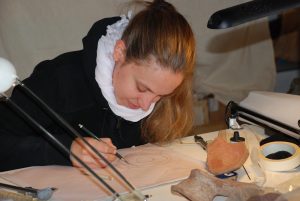Researcher of ERC project DiverseNile (2020-2022)

Main areas of research:
Kushite Egypt, Napatan and Meroitic periods of the Kingdom of Kush, Cultural Transfer betweenEgypt and Kush and vice versa, Cultural History of Nubia, Sacral/Festival Architectureand Religious Festivals in Kushite Thebes and Late Period Egypt
Education:
Since December 2008 Doctoral studies in Egyptology and Sudanarchaeology, Thesis title »25th Dynasty Kiosks and Entrance Colonnades in Egypt and Nubia, with a focus on Kushite Thebes« (First supervisor: Prof. Dr. Frank Kammerzell), Humboldt Universität zu Berlin
2006 Obtaining academic degree of M.A. Magister Artium (grade 1,0), Humboldt Universität zu Berlin
October 1999 – March 2006 Studies in Egyptology, Sudanarchaeology and Classical Archaeology, Humboldt Universität zu Berlin
October 2003 – March 2004 Studies in Egyptology, Università degli Studi di Roma »La Sapienza«
Career History:
April 2020 to February 2022: Researcher of ERC project DiverseNile, LMU Munich
December 2017 – Nov. 2019: Research Associate (Prof. Dr. Julia Budka, Institute for Egyptology and Coptology, Ludwig-Maximilians-University Munich)
July 2014 – December 2016: Project Member at the »Friedrich W. Hinkel Archive Digitization Project«, Friedrich W. Hinkel Research Centre, GermanArchaeological Institute, Headquarters, Berlin
May, November 2011 – January 2012: Research Associate at the Officeof the Secretary-General, Scientific Department, German Archaeological Institute, Headquarters,Berlin
June – December 2011: Research Associate at the GHS-Project »Totenkult im Tempelgrab – Zur Rekonstruktion funerärer Praktiken im spätzeitlichen Theben (Ägypten)« (Prof. Dr. Julia Budka), Austrian Academy of Sciences/Humboldt Universität zu Berlin
September 2006 – May 2011: Research Assistant at theOffice of the Secretary-General and the Edidorial Office, Scientific Department, German Archaeological Institute, Headquarters,Berlin
November 2010 – January 2011: Scholarship of the DAAD (German Academic Exchange Service) for Luxor/Egypt
Field Work:
January – February 2012: Sai Island/Sudan, Université Lille III/Austrian Academyof Sciences (Prof. Dr.Julia Budka)
October – November 2009, February – March 2008, October – November 2007: Luxor, Asasif/Egypt, Austrian Academy of Sciences/Humboldt Universität zu Berlin (Prof. Dr. Julia Budka)
February – March 2004, March 2003: Musawwarat es Sufra/Sudan, Humboldt Universität zu Berlin (Prof. Dr. Steffen Wenig)
February 2003: Hamadab/Sudan, Humboldt Universität zu Berlin/University of Shendi Sudan)(Dr. Pawel Wolf)
Juny– July 2002: Innsbruck, Goldbühel /Austria, Leopold-Franzens-University Innsbruck (Prof.Dr. Gerhard Tomedi)

